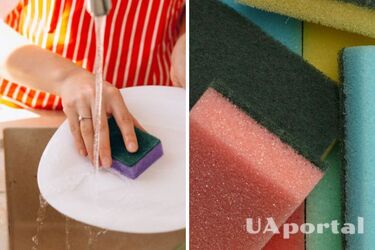How often do you need to change your dishwashing sponge: you'll be surprised

Dishwashing sponges are a real Mecca for bacteria. Their humid environment and porosity create ideal conditions for the growth of harmful microorganisms that can negatively affect your health.
Southern Living writes about this.
A study in Germany found that popular methods of disinfecting sponges, such as microwaving or boiling water, are not always effective. Bacteria and pathogens can easily survive such procedures, and some of them are even becoming more resistant to antibiotics.
To protect yourself and your family, experts recommend changing your dishwashing sponge every week. Don't forget to rinse it thoroughly after each use, removing any food and detergent residue.
Here are a few reasons why it's important to change your dish sponge every week:
- Bacteria: Sponges are a breeding ground for bacteria such as E. coli, salmonella, and staphylococcus. These bacteria can cause a variety of illnesses, including diarrhea, food poisoning, and skin infections.
- Ineffective disinfection: Studies have shown that popular sponge disinfection methods do not always kill all bacteria. Some may even become more resistant to antibiotics.
- Odor: Over time, sponges start to smell unpleasant. This odor indicates that a lot of bacteria has accumulated on it.
- Reduced effectiveness: Dirty sponges don't clean dishes as well.
To keep your kitchen clean and healthy, follow these simple tips:
- Change your dishwashing sponge every week.
- Rinse the sponge thoroughly after each use.
- Do not use the same sponge for washing dishes and other surfaces.
- Store the sponge in a dry place.
- Clean your sink regularly.
Remember that simply replacing your dishwashing sponge can help you protect yourself and your family from harmful bacteria.
If you want to get the latest news about the war and events in Ukraine, subscribe to our Telegram channel!
